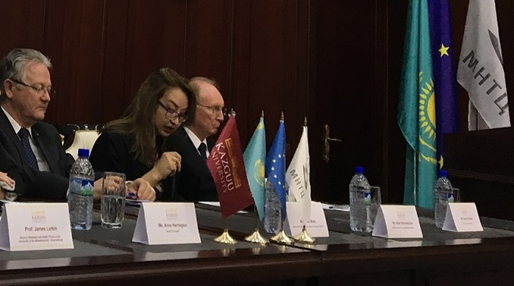Bidding Farewell to Nuclear Arms, Engaging in Peaceful Use of Nuclear Energy: a Public Discussion at the Academic Diplomatic Club

.jpg) 24 May 2018. Ambassadors and members of the diplomatic corps, government officials, representatives of academia, faculty and students, gathered on ISTC initiative at the Kazakh University of Law and Humanities’ Academic Diplomatic Club to discuss the leadership model of two countries – Kazakhstan and the Republic of South Africa - that have renounced possession of nuclear, and, at the same time, act in favor of international cooperation in nuclear energy. By tracking the trajectory of the Kazakhstani and of South African actions in the non-proliferation area, the forum provided valuable insights on what roles middle size regional powers can play in the international system.
24 May 2018. Ambassadors and members of the diplomatic corps, government officials, representatives of academia, faculty and students, gathered on ISTC initiative at the Kazakh University of Law and Humanities’ Academic Diplomatic Club to discuss the leadership model of two countries – Kazakhstan and the Republic of South Africa - that have renounced possession of nuclear, and, at the same time, act in favor of international cooperation in nuclear energy. By tracking the trajectory of the Kazakhstani and of South African actions in the non-proliferation area, the forum provided valuable insights on what roles middle size regional powers can play in the international system.
Rector Talgat welcomed the guests at the premises of KAZGUU. Mr. Eddie Maier, Deputy Head of Unit at the European Commission Directorate - General for International Cooperation and Development, introduced the topic and highlighted ISTC role and mission as illustrated by CBRN safety and security projects.
.jpg) H.E Ms. Keitumetsi Seipelo Thandeka Matthews, Ambassador of South Africa to Kazakhstan, reminded the decision to renounce possession of nuclear weapons, taken by RSA on the initiative of the late President Nelson Mandela, and suggested that it may be appropriate to establish in his name a reward on contribution to non-proliferation. Ms. Arman Muhamedzanova, senior expert, Multilateral Cooperation Department, MFA, referred to the statement by President Nazarbayev while chairing the UN Security Council thematic debate on 18 January 2018, recalling that mutual trust could facilitate new model of international cooperation, pointing to his own country’s renunciation of nuclear weapons as an example that could serve as guidance to other countries. Prof. James Larkin, Director, Radiation and Health Physics Unit, University of the Witwatersrand, Johannesburg shared lessons learned from RSA decision to renounce its nuclear weapons. Ms. Anne Harrington, Principal, Harrington Consulting LLC, talked about the promotion of strong global nuclear security practices, and responsible peaceful nuclear trade.
H.E Ms. Keitumetsi Seipelo Thandeka Matthews, Ambassador of South Africa to Kazakhstan, reminded the decision to renounce possession of nuclear weapons, taken by RSA on the initiative of the late President Nelson Mandela, and suggested that it may be appropriate to establish in his name a reward on contribution to non-proliferation. Ms. Arman Muhamedzanova, senior expert, Multilateral Cooperation Department, MFA, referred to the statement by President Nazarbayev while chairing the UN Security Council thematic debate on 18 January 2018, recalling that mutual trust could facilitate new model of international cooperation, pointing to his own country’s renunciation of nuclear weapons as an example that could serve as guidance to other countries. Prof. James Larkin, Director, Radiation and Health Physics Unit, University of the Witwatersrand, Johannesburg shared lessons learned from RSA decision to renounce its nuclear weapons. Ms. Anne Harrington, Principal, Harrington Consulting LLC, talked about the promotion of strong global nuclear security practices, and responsible peaceful nuclear trade.
.jpg)
The discussion at the Academic Diplomatic Club was a side event to the workshop, jointly convened on 24 - 25 May in Astana by ISTC and the Ministry of Investments and Development of Kazakhstan, on «Challenges of Scientific and Technological Evolution for Export Control Systems». The workshop is only one of a series of activities under the ISTC-implemented, EU-funded regional project “CBRN Export Control on Dual-Use Materials and Technologies in Central Asia”, involving ten countries from Central Asia, the Caucuses, Mongolia, Afghanistan and Pakistan. This project – inter alia – aims at regionalizing the positive experience of Kazakhstan acquired through a previous pilot project that helped bring in European expertise in the process of the establishment of the Kazakhstani export control system. In future, ISTC cooperation on export control may take place also with the Republic of South Africa. The International Science and Technology Center collaborates with the Ministry of Foreign Affairs of Kazakhstan on a number of themes of mutual interest, including on non-proliferation.
This partnership was recognized during the event at the Academic Diplomatic Club: on behalf of MFA, Ms Muhamedzanova presented the Ministry’s commemorative medals to ISCT’s Executive Director David Cleave, Deputy Executive Director Aidyn Turebayev and to ISTC Senior Program Manager and Diplomatic Advisor Dr. Kamen Velichkov. KAZGUU has acknowledged all panel participants and its ISTC partners with Certificates of Appreciation.

